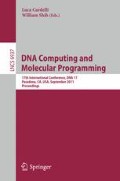Abstract
Is Winfree’s abstract Tile Assembly Model (aTAM) “powerful?” Well, if certain tiles are required to “cooperate” in order to be able to bind to a growing tile assembly (a.k.a., temperature 2 self-assembly), then Turing universal computation and the efficient self-assembly of N ×N squares is achievable in the aTAM (Rotemund and Winfree, STOC 2000). So yes, in a computational sense, the aTAM is quite powerful! However, if one completely removes this cooperativity condition (a.k.a., temperature 1 self-assembly), then the computational “power” of the aTAM (i.e., its ability to support Turing universal computation and the efficient self-assembly of N ×N squares) becomes unknown. On the plus side, the aTAM, at temperature 1, is not only Turing universal but also supports the efficient self-assembly N ×N squares if self-assembly is allowed to utilize three spatial dimensions (Fu, Schweller and Cook, SODA 2011). In this paper, we investigate the theoretical “power” of a seemingly simple, restrictive variant of Winfree’s aTAM in which (1) the absolute value of every glue strength is 1, (2) there is a single negative strength glue type and (3) unequal glues cannot interact (i.e., glue functions must be “diagonal”). We call this abstract model of self-assembly the restricted glue Tile Assembly Model (rgTAM). We achieve two positive results. First, we show that the tile complexity of uniquely producing an N ×N square in the rgTAM is O(logN). In our second result, we prove that the rgTAM is Turing universal.
Access this chapter
Tax calculation will be finalised at checkout
Purchases are for personal use only
Preview
Unable to display preview. Download preview PDF.
References
Adleman, L., Cheng, Q., Goel, A., Huang, M.-D.: Running time and program size for self-assembled squares. In: Proceedings of the Thirty-Third Annual ACM Symposium on Theory of Computing, pp. 740–748. ACM, New York (2001)
Adleman, L.M., Kari, J., Kari, L., Reishus, D., Sosík, P.: The undecidability of the infinite ribbon problem: Implications for computing by self-assembly. SIAM Journal on Computing 38(6), 2356–2381 (2009)
Barish, R.D., Schulman, R., Rothemund, P.W., Winfree, E.: An information-bearing seed for nucleating algorithmic self-assembly. Proceedings of the National Academy of Sciences 106(15), 6054–6059 (2009)
Chen, H.-L., Schulman, R., Goel, A., Winfree, E.: Reducing facet nucleation during algorithmic self-assembly. Nano Letters 7(9), 2913–2919 (2007)
Cook, M., Fu, Y., Schweller, R.: Temperature 1 self-assembly: Deterministic assembly in 3d and probabilistic assembly in 2d. In: Proceedings of the 22nd Annual ACM-SIAM Symposium on Discrete Algorithms (2011)
Doty, D.: Randomized self-assembly for exact shapes. SIAM Journal on Computing 39(8), 3521–3552 (2010)
Doty, D., Kari, L., Masson, B.: Negative interactions in irreversible self-assembly. In: Sakakibara, Y., Mi, Y. (eds.) DNA 16 2010. LNCS, vol. 6518, pp. 37–48. Springer, Heidelberg (2011)
Doty, D., Lutz, J.H., Patitz, M.J., Summers, S.M., Woods, D.: Intrinsic universality in self-assembly. In: Proceedings of the 27th International Symposium on Theoretical Aspects of Computer Science, pp. 275–286 (2009)
Doty, D., Patitz, M.J., Reishus, D., Schweller, R.T., Summers, S.M.: Strong fault-tolerance for self-assembly with fuzzy temperature. In: Proceedings of the 51st Annual IEEE Symposium on Foundations of Computer Science (FOCS 2010), pp. 417–426 (2010)
Doty, D., Patitz, M.J., Summers, S.M.: Limitations of self-assembly at temperature 1. Theoretical Computer Science 412, 145–158 (2011)
Kao, M.-Y., Schweller, R.T.: Reducing tile complexity for self-assembly through temperature programming. In: Proceedings of the 17th Annual ACM-SIAM Symposium on Discrete Algorithms (SODA 2006), Miami, Florida, January 2006, pp. 571-580 (2007)
Kao, M.-Y., Schweller, R.T.: Randomized self-assembly for approximate shapes. In: Aceto, L., Damgård, I., Goldberg, L.A., Halldórsson, M.M., Ingólfsdóttir, A., Walukiewicz, I. (eds.) ICALP 2008, Part I. LNCS, vol. 5125, pp. 370–384. Springer, Heidelberg (2008)
Kinsella, J.M., Ivanisevic, A.: Enzymatic clipping of dna wires coated with magnetic nanoparticles. Journal of the American Chemical Society 127(10), 3276–3277 (2005)
Lathrop, J.I., Lutz, J.H., Summers, S.M.: Strict self-assembly of discrete Sierpinski triangles. Theoretical Computer Science 410, 384–405 (2009)
Luhrs, C.: Polyomino-safe dna self-assembly via block replacement. DNA, 112–126 (2008)
Majumder, U., Reif, J.: A framework for designing novel magnetic tiles capable of complex self-assemblies. In: Calude, C.S., Costa, J.F., Freund, R., Oswald, M., Rozenberg, G. (eds.) UC 2008. LNCS, vol. 5204, pp. 129–145. Springer, Heidelberg (2008)
Mao, C., Sun, W., Seeman, N.C.: Designed two-dimensional DNA holliday junction arrays visualized by atomic force microscopy. Journal of the American Chemical Society 121(23), 5437–5443 (1999)
Reif, J., Sahu, S., Yin, P.: Complexity of graph self-assembly in accretive systems and self-destructible systems. In: Carbone, A., Pierce, N.A. (eds.) DNA 2005. LNCS, vol. 3892, pp. 257–274. Springer, Heidelberg (2006)
Rickwood, D., Lund, V.: Attachment of dna and oligonucleotides to magnetic particles: methods and applications. Fresenius’ Journal of Analytical Chemistry 330, 330–330 (1988), doi:10.1007/BF00469247
Rothemund, P.W.K.: Theory and experiments in algorithmic self-assembly, Ph.D. thesis, University of Southern California (December 2001)
Rothemund, P.W.K., Winfree, E.: The program-size complexity of self-assembled squares (extended abstract). In: STOC 2000: Proceedings of the Thirty-Second Annual ACM Symposium on Theory of Computing, Portland, Oregon, United States, pp. 459–468. ACM, New York (2000)
Rothemund, P.W.K., Papadakis, N., Winfree, E.: Algorithmic self-assembly of DNA Sierpinski triangles. PLoS Biology 2(12), 2041–2053 (2004)
Soloveichik, D., Winfree, E.: Complexity of self-assembled shapes. SIAM Journal on Computing 36(6), 1544–1569 (2007)
Winfree, E.: Algorithmic self-assembly of DNA, Ph.D. thesis, California Institute of Technology (June 1998)
Winfree, E., Liu, F., Wenzler, L.A., Seeman, N.C.: Design and self-assembly of two-dimensional DNA crystals. Nature 394(6693), 539–544 (1998)
Author information
Authors and Affiliations
Editor information
Editors and Affiliations
Rights and permissions
Copyright information
© 2011 Springer-Verlag Berlin Heidelberg
About this paper
Cite this paper
Patitz, M.J., Schweller, R.T., Summers, S.M. (2011). Exact Shapes and Turing Universality at Temperature 1 with a Single Negative Glue. In: Cardelli, L., Shih, W. (eds) DNA Computing and Molecular Programming. DNA 2011. Lecture Notes in Computer Science, vol 6937. Springer, Berlin, Heidelberg. https://doi.org/10.1007/978-3-642-23638-9_15
Download citation
DOI: https://doi.org/10.1007/978-3-642-23638-9_15
Publisher Name: Springer, Berlin, Heidelberg
Print ISBN: 978-3-642-23637-2
Online ISBN: 978-3-642-23638-9
eBook Packages: Computer ScienceComputer Science (R0)

